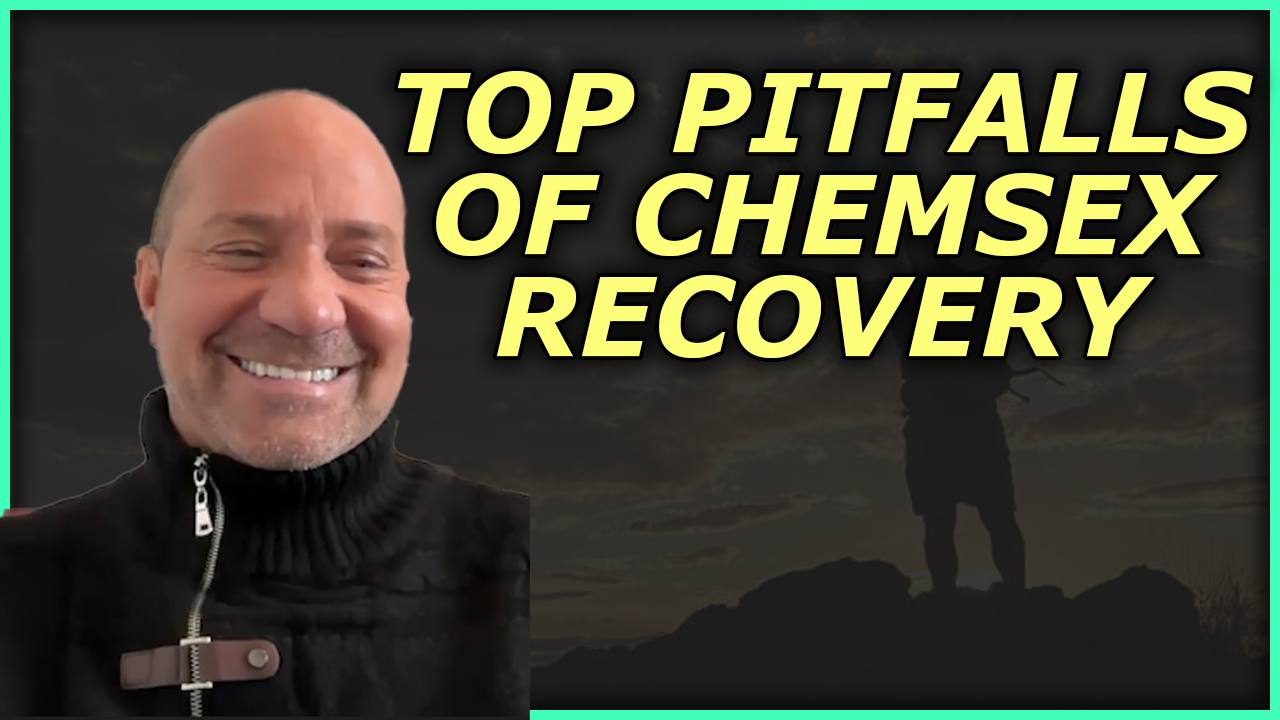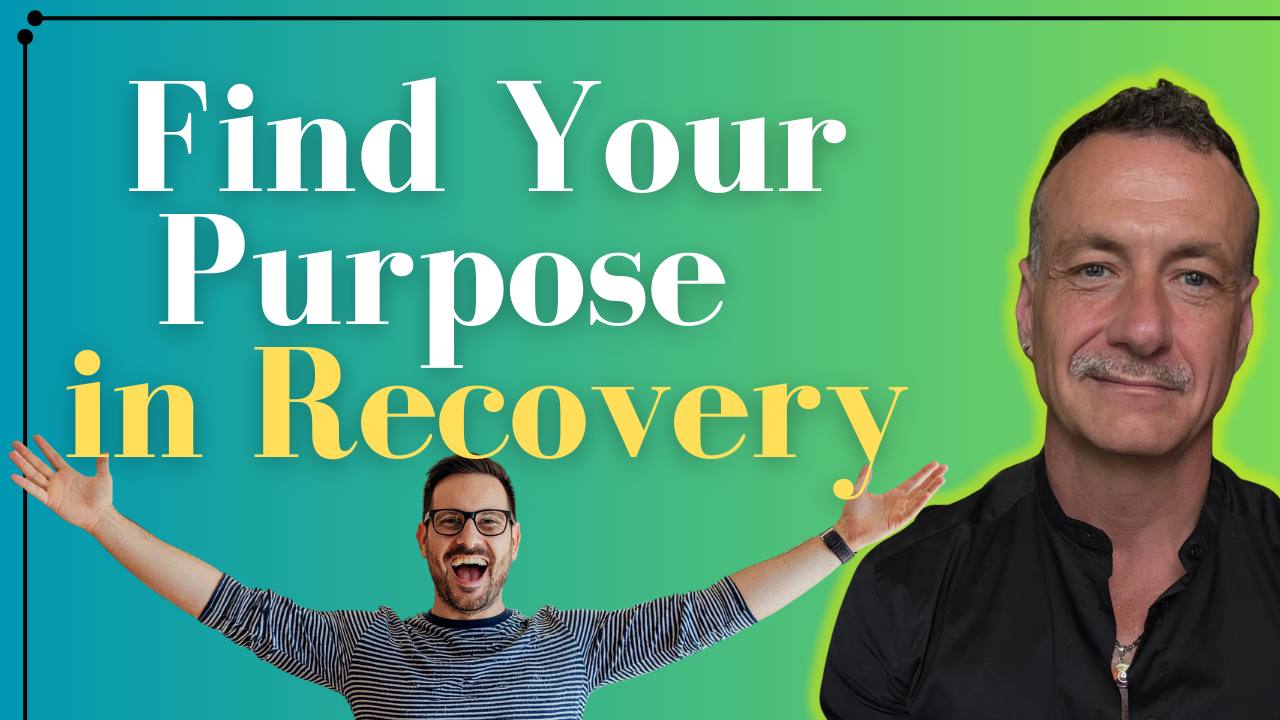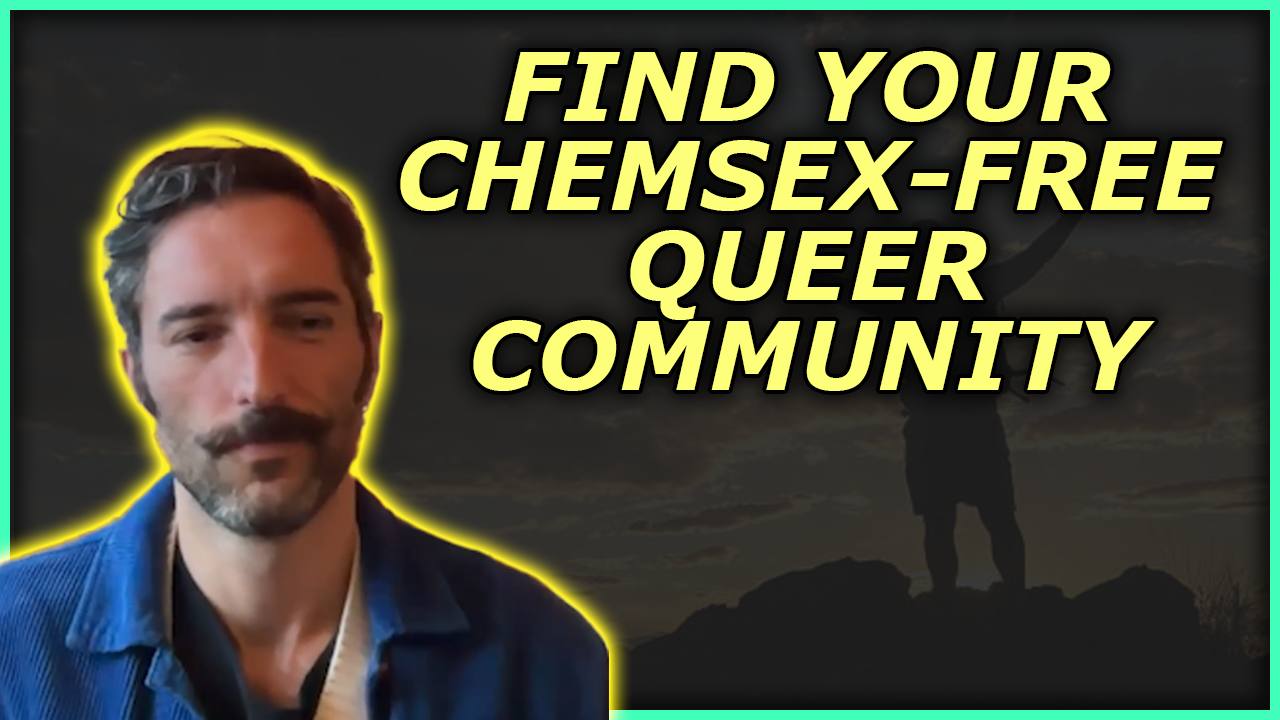The Myth of Abstinence

Content Warning: This study guide discusses addiction, substance use, recovery, and internalized shame. If you feel triggered or unsafe, please reach out to your support network or local emergency services.
I was walking in nature one day when I conceived the idea of launching my own coaching program.
After coming out on the other side of meth misuse, I saw the gap in services for gay men.
Additionally, I had developed a philosophy about recovery that, to me, seemed counterintuitive to everything around me.
I didn't just want to help gay men stop using meth; I wanted to help them feel empowered, to have agency over their recovery, to be the executive of their life.
I wanted to develop a shame-free environment that didn't lead with fear and punishment.
Excited about this prospect, I wondered if anyone else shared my sentiment and was doing something similar.
I went to Instagram and put in some keywords. The account at the top of the list was Dr. Adi Jaffe.
I dove deep into his account and his program, IGNTD.
What I found was a welcome change. A resonance. Hope for the recovery industry. AND the drive to move forward.
This week, I had the distinct privilege of interviewing my mentor, the man who has influenced me the most, both professionally and personally.
BIG honor.
And you won't have to listen long to understand where I have been most influenced.
Dr. Adi Jaffe's perspective on addiction and recovery offers a radical departure from traditional abstinence-focused models.
With over two decades of experience and his own journey through methamphetamine addiction, Dr. Jaffe challenges the fundamental language and metrics we use to measure recovery success.
His conversation illuminates how shame-based recovery models may inadvertently keep people stuck in cycles of use, and how shifting our understanding from "days sober" to "quality of life" can transform the entire recovery experience.
For gay men recovering from chemsex addiction, this reframing holds particular significance. The intersection of sexual identity, intimacy, and substance use creates unique challenges that traditional recovery models often fail to address.
Dr. Jaffe's approach acknowledges that recovery isn't simply about stopping substance use—it's about rediscovering who you are beneath the layers of shame, trauma, and adaptive behaviors that led to addiction in the first place.
The Abstinence Violation Effect: Redefining Success
One of the most damaging aspects of traditional recovery models is what researchers call the "abstinence violation effect." This phenomenon occurs when someone views recovery as an all-or-nothing endeavor measured solely by consecutive days without using. Under this model, a single use day transforms someone from having 29 days sober to having zero—from an A+ to an F in their recovery grade.
Dr. Jaffe introduces a different metric: percentage of days abstinent. In this framework, someone who used for one day out of thirty is still 97% sober. This isn't about minimizing the significance of use; it's about maintaining perspective and preventing the catastrophic thinking that often leads to extended relapses. When you believe you've "fallen off the wagon" completely, the psychological barrier to getting back on becomes insurmountable. But when you recognize you're still maintaining a high success rate, returning to your recovery path feels achievable.
For those recovering from chemsex, where use is often intertwined with sexual expression and community connection, this reframing is particularly crucial. The shame spiral following a use episode can feel devastating when your entire identity feels wrapped up in both your sexuality and your recovery. Recognizing that one challenging night doesn't erase months of healing work can be the difference between a temporary setback and a complete relapse.
Reflective Question: How has the concept of "consecutive days sober" affected your recovery journey? Has this measurement ever contributed to extending a period of use because you felt you'd already "ruined" your sobriety?
Action Exercise - Reframing Your Recovery Metrics: Create a new way to track your recovery that includes multiple dimensions beyond consecutive days. Consider tracking: quality of sleep, meaningful connections, honest conversations, days you felt present in your body, or times you successfully navigated triggers. Post this somewhere visible as a reminder that recovery encompasses far more than a single number.
Challenging Shame-Based Recovery Language
The traditional addiction treatment field is saturated with language that frames people as fundamentally broken. Terms like "diseased brain," "genetic flaw," "damaged," and "powerless" dominate the recovery landscape. Dr. Jaffe passionately challenges this narrative, arguing that after working with thousands of people in recovery, he disagrees with almost all of it.
This language is particularly insidious because it becomes a self-fulfilling prophecy. When you believe you are fundamentally broken, that your brain doesn't work correctly, that you're genetically flawed, you approach recovery from a place of deficiency rather than possibility. You stop asking "How can I build a life I don't want to escape from?" and start asking "How do I manage being this broken person forever?"
The gay community has already internalized layers of shame around sexual identity, often carrying messages from childhood about being wrong, sinful, or damaged simply for existing. When chemsex enters the picture, it adds another layer of shame—shame about losing control, shame about sexual behaviors while high, shame about the seeming inability to have intimate connections without substances. Traditional recovery language compounds this shame, suggesting that addiction proves you were already broken.
Dr. Jaffe's approach invites a different question: What if you're not broken at all? What if your addiction was a completely logical response to circumstances that felt unmanageable? What if the same brain that developed addictive patterns has the capacity to develop new, healthier ones?
Journal Prompt: What shame-based language about addiction have you internalized? Write down the specific words or phrases you use to describe yourself in relation to your substance use. Then, for each one, write an alternative that acknowledges your struggle without defining you as fundamentally flawed.
Quality of Life Over Day Counting
Perhaps the most profound shift Dr. Jaffe advocates is measuring recovery success by quality of life rather than consecutive days sober. This isn't to dismiss the importance of abstinence for those pursuing it, but rather to expand the definition of what recovery actually means.
Ask yourself: Would you rather have someone who's been sober for five years but is miserable, isolated, and constantly white-knuckling through life? Or would you prefer someone who's been working on their recovery for three years, had a few setbacks, but has rebuilt meaningful relationships, found purpose, and experiences genuine joy most days?
Traditional recovery models often create this paradox where people achieve long-term abstinence while remaining deeply unhappy. They've stopped using substances but haven't addressed the underlying reasons they started using in the first place. They've removed the coping mechanism without developing new ones or healing the wounds that made that coping mechanism feel necessary.
For gay men in chemsex recovery, this quality of life metric is essential. Chemsex often serves multiple functions: it facilitates connection in a community where intimacy can feel scarce, it provides a temporary escape from minority stress and internalized homophobia, it creates a space where sexual expression feels less encumbered by shame. Simply removing the substance without addressing these underlying needs leaves a void. Quality of life-focused recovery asks: Are you building genuine intimacy? Are you healing your relationship with your sexuality? Are you finding belonging in sober spaces?
Reflective Question: If you measured your recovery by quality of life rather than days sober, what specific areas would you evaluate? What aspects of your life have improved since beginning your recovery journey, even if your abstinence hasn't been perfect?
Action Exercise - Quality of Life Assessment: Spend time this week rating different life domains on a scale of 1-10: relationships, physical health, mental/emotional wellbeing, sense of purpose, sexual satisfaction, community connection, financial stability, and personal growth. Identify which areas have improved since beginning recovery work and which still need attention. This becomes your roadmap for holistic healing.
The Journey Back to Self
Both Dallas and Dr. Jaffe emphasize that recovery is fundamentally a "journey home to self"—a return to the innocent, worthy person you were before trauma, shame, and survival mechanisms obscured your true nature. This concept draws from the understanding that we were all born deserving of love, safety, and nourishment. Somewhere along the way, through experiences of trauma, rejection, or simply navigating a world that felt unsafe for who we authentically are, we lost connection with that truth.
Dr. Jaffe notes that many people in addiction never knew themselves without substances, having started using young or turning to drugs during formative identity development periods. For gay men, this often coincides with the process of coming out and navigating a sexuality that may have felt unwelcome or dangerous in their family or community of origin. Chemsex can become intertwined with sexual identity itself—the first times feeling free to express desire, the first community that felt welcoming, the first experiences of sexual pleasure without shame.
The journey back to self, then, requires disentangling substance use from identity. It requires asking: Who am I when I'm not using? What do I actually desire versus what the drug made me think I desired? How do I connect with others authentically? What does my sexuality look like when it's not mediated by chemicals?
This journey is not linear. It involves excavating layers of adaptive behaviors, healing trauma, and slowly building trust with yourself again. It requires patience and compassion, recognizing that you developed these patterns for good reasons—they helped you survive. The work now is discovering you no longer need those old survival mechanisms because you're building a life where you can thrive.
Journal Prompt: Write a letter to your younger self—the person you were before addiction, before you learned to hide parts of yourself, before substances became a solution. What would you tell them? What do you wish they had known? What parts of that person are you reclaiming in recovery?
Choosing Your Delusions: The Power of Belief
One of Dr. Jaffe's most provocative concepts is what he calls "choosing your delusions." He argues that there is no objective reality—we all view the world through lenses shaped by our experiences, beliefs, and biases. Two people can watch the same TV show and walk away with completely different interpretations, focused on different characters and scenes. Neither is objectively "right"—they're simply filtering the experience through their unique perspective.
If we're all living in delusion anyway, Dr. Jaffe asks, why not choose delusions that serve your wellbeing? Traditional recovery models often reinforce limiting beliefs: "You're an addict for life," "You'll always be one drink away from disaster," "Your brain is permanently damaged," "You're powerless." These beliefs create a reality where recovery feels precarious and joyless.
But what if you chose different beliefs? What if you chose to believe that people are inherently good and want to help? That you are lovable and worthy exactly as you are? That you have the capacity for change and growth? Research on happiness shows that people who experience more joy and life satisfaction are not objective realists—they wear "rose-colored glasses," overestimate their abilities, and maintain optimistic biases about the future. And they get to walk through the world experiencing contentment.
For gay men recovering from chemsex, this reframing is transformative. Many internalized beliefs that make recovery feel impossible: "I can't have satisfying sex without drugs," "No one will want me if I'm sober," "I'll never fit into the gay community without partying," "I'm too damaged for real intimacy." These beliefs feel true because they've been reinforced by experience and community messaging. But they're not objective truths—they're perspectives that can be challenged and rewritten.
Reflective Question: What limiting beliefs about yourself and your recovery have you been operating from? How might these beliefs be serving as a self-fulfilling prophecy? What would become possible if you chose to believe something different?
Action Exercise - Belief Inventory and Rewrite: Take inventory of your core beliefs about yourself, recovery, relationships, and your capacity for change. For each limiting belief, write an alternative that feels slightly more empowering—you don't have to fully believe it yet, just make it possible. Practice stating these new beliefs to yourself daily, even if they feel like lies at first. Notice over time how your behavior begins to shift.
Rewriting Your Story
As Dr. Jaffe and Dallas discuss, one of the most powerful aspects of recovery is learning that you control your own narrative. For too long, you may have let others define your story—parents, partners, communities, or even the voice of addiction itself told you who you were and what you were capable of. The work of recovery involves reclaiming authorship of your life.
This doesn't mean denying or minimizing what happened. It means choosing which parts of your story to emphasize, how to interpret your experiences, and what meaning to make from them. The same experience can be framed as "I'm a failure who relapsed" or "I'm someone learning to navigate challenges who had a setback and got back on track." Both describe the same event, but they create vastly different internal realities.
Dr. Jaffe emphasizes that whatever beliefs you hold about your capacity for change will prove true. If you believe you're stuck and will never change, you'll find evidence to confirm that belief and give up on opportunities that might have worked. If you believe there's a solution out there—whether it's coaching, therapy, 12-step programs, SMART Recovery, or something else entirely—you'll keep searching until you find what works for you.
The LGBTQ+ community has always understood the power of controlling your narrative. Coming out itself is an act of reclaiming your story from those who tried to tell you who you should be. Recovery extends that practice, allowing you to define yourself beyond the labels of "addict," "party boy," or any other identity that felt imposed rather than chosen.
Reflective Question: Who has had power to define your story up until now? What would it mean to fully reclaim authorship of your narrative? What chapters would you rewrite with compassion rather than shame?
Journal Prompt: Write your recovery story as if you were telling it to someone you deeply care about who is just beginning their journey. What would you emphasize? What lessons would you highlight? What hope would you offer? Notice how this version might differ from how you typically tell your story to yourself.
The Work is Hard, But It's Worth It
Dr. Jaffe closes with a reminder that bears repeating: the work is hard, but it's worth it. Recovery—real, transformative recovery—requires consistent effort, uncomfortable self-examination, and patience with a non-linear process. It means sitting with difficult emotions you previously numbed, facing relationships you've damaged, and rebuilding trust with yourself one decision at a time.
But on the other side of that work exists a world you may not have known was possible. A world where you feel present in your body, connected to others authentically, capable of experiencing joy without substances. A world where sex can be intimate and meaningful rather than just chemically enhanced sensation. A world where your queerness is a source of pride rather than pain, where community connection doesn't require getting high, where you know yourself deeply enough to make choices that serve your wellbeing.
This isn't about achieving perfection or never struggling again. It's about building a life substantial enough that when challenges arise—and they will—you have resources, connections, and self-awareness to navigate them without returning to old patterns. It's about transforming your relationship with yourself so fundamentally that the person you're becoming no longer needs substances to cope with being alive.
For those recovering from chemsex addiction specifically, this transformation might mean learning to connect intimately while sober, building sexual confidence that doesn't depend on drugs, finding community spaces where you belong without needing to party, and healing the wounds that made escaping through substances feel necessary in the first place.
Action Exercise - Vision of Your Recovered Life: Spend 20 minutes writing in detail about what your life looks like when you've done the work Dr. Jaffe describes. Be specific: Where do you live? Who's in your life? How do you spend your time? What does intimacy look like? How does your body feel? What brings you joy? This isn't fantasy—this is creating a roadmap for what you're working toward. Return to this vision regularly, especially when the work feels too hard.
Recovery is not built in a day. It's constructed through countless small decisions, perspective shifts, and acts of self-compassion. Dr. Jaffe and Dallas both emphasize that your timeline is your own—there's no universal schedule for healing. What matters is that you continue showing up for yourself, challenging the limiting beliefs that keep you stuck, and building a life that feels worth living without substances.
The conversation between these two recovery advocates offers permission to define success on your own terms, to measure progress by quality of life rather than just abstinence, and to recognize that you are not broken—you're a human being learning to heal. Whether you're in active recovery, still using but considering change, or supporting someone on this journey, the message is clear: transformation is possible, and the work is worth it.
Remember, you don't have to do this alone. Resources exist, whether through coaching programs, support groups, therapy, or community spaces designed for LGBTQ+ individuals in recovery. The most important step is believing that change is possible for you—because once you believe that, you'll find the path forward.
Love, Dallas





Responses